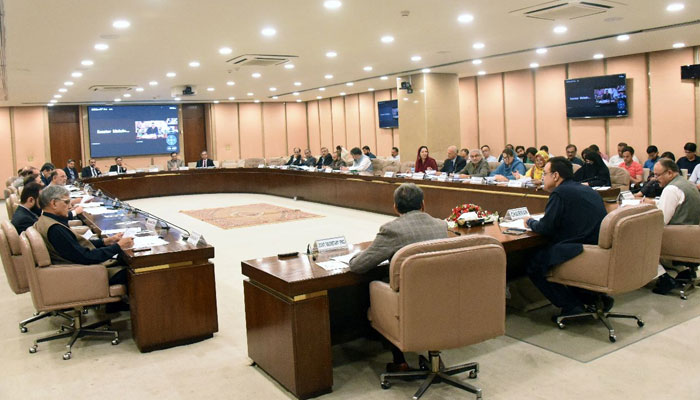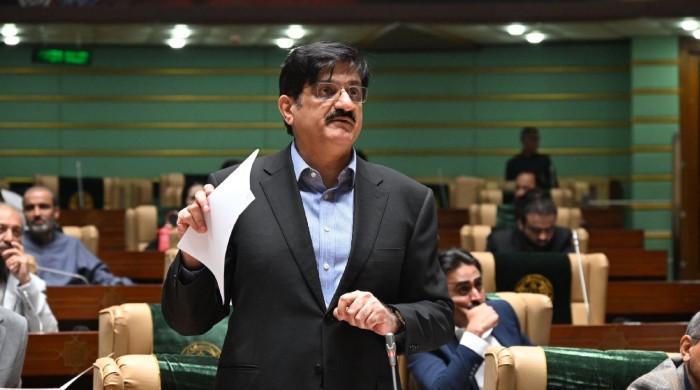SC judges getting paid more than president, PM
Registrar fails to appear before PAC for audit of 10-year expenditures of Supreme Court
May 17, 2023

- Attorney general says SC expenditures can be audited by PAC.
- PAC seeks details of dam funs set up by Saqib Nisar during his tenure.
- SC registrar tells PAC that its jurisdiction does not extend apex court.
ISLAMABAD: Supreme Court judges earn more than the president, the prime minister, ministers, federal secretaries and parliamentarians, reported The News citing the data submitted to the Public Accounts Committee (PAC) on Tuesday.
Among the list, the chief justice of Pakistan receives the highest salary, the supreme court judges second, the president third while the prime minister is getting salary even less than ministers and federal secretaries.
At a PAC meeting, Chairman Noor Alam Khan told the members that the president’s salary was Rs896,550, the prime minister’s Rs201,574, the CJP’s Rs1,527,399, supreme court judges’ Rs 1,470,711 and federal ministers’ Rs 338,125.
The salary of a parliamentarian is Rs 188,000 while a grade-22 officer gets Rs 591,475 a month, he shared.
The information was shared with the NA body after it sought details of perks and privileges received by the president, the prime minister, the CJP and other supreme court judges.
SC registrar skips PAC meeting
Meanwhile, the high-powered NA committee has summoned the SC Registrar again at the next meeting and warned that his arrest warrants will be issued if he fails to appear for the second time.
The SC official was asked to appear before the PAC for the audit of over 10-year expenditures of the apex court
“If the principal accounting officer of the Supreme Court of Pakistan does not appear before the PAC, why will the rest of institutions be accountable,” Noor remarked.
Attorney General Mansoor Awan said SC expenditures could be audited and the Public Accounts Committee might review audit reports.
Noor said the registrar had contended that the audit of SC accounts was under hearing and does not fall under the purview of the PAC and that he was not legally bound to appear before the committee.
The PAC chairman said 95 SC audit paras had been reported so far, out of which 12 had been settled. “The SC registrar should appear before the committee for examining the remaining audit paras,” he said.
Audit officials said there had been audit objections to the Diamer Bhasha and Mohmand Dam Fund, on which the State Bank of Pakistan sought an answer as a private account was opened along with the government account in which the money was kept.
The chairman said that along with other institutions, the National Assembly and the Election Commission of Pakistan were accountable to this committee for all their accounts, so what was the reason why the Supreme Court of Pakistan should not be held accountable?
The accountant general of Pakistan shared details of mandatory expenses of the apex court from 2010-11 to 2020-21 on the agenda of the PAC.
Noor said the committee would not do anything against the Constitution. The principal accounting officer of the SC was summoned as there were 83 audit objections raised, out of which only 12 were settled.
During the meeting, Hussain Tariq said there was no voting on mandatory expenses, but there was a discussion on the budget.
The auditor general said they audited the accounts of all institutions. Noor said that Auditor General Office audited SC expenditures from 2015 to 2021.
At this, Tahir said under Articles 171 and 172 of the Constitution, every organization taking money from the government was liable to audit and accountable to the PAC.
Noor said they had also written to the NA Speaker to consult senior lawyers including Irfan Qadir, Yasin Azad and Shabar Rizvi.
The committee said details of dam funds given to the Supreme Court from 2010 to 2023 should be provided. Noor said former CJP Saqib Nisar himself had written at the time the fund was established there would be an audit, but now details were not being shared.
Meanwhile, the PAC was told that its jurisdiction did not extend to scrutinising the financial affairs of the Supreme Court of Pakistan, hence the SC registrar was not legally obliged to appear before it.
Khurram Shehzad, assistant registrar (Admin), on behalf of the SC registrar, intimated to the PAC that the collection and utilisation of funds for the Diamer Bhasha and Mohmand Dams was the subject matter of constitutional petition No 57 of 2016, presently pending with the Supreme Court of Pakistan.
The PAC was informed that the Constitution erected a firewall between the judiciary and other organs of the state (Articles 68, 69 and 175) to ensure the independence of the respective organs of the state.
The remuneration and administrative expenses of the Supreme Court of Pakistan, as charged upon the Federal Consolidated Fund, are separate from the demands for grants submitted to the National Assembly.











